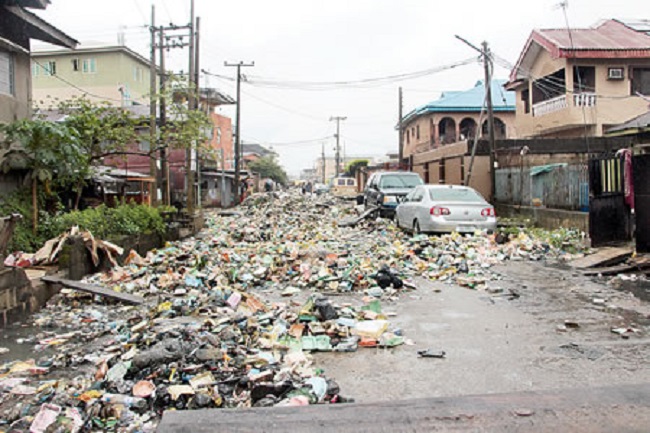A Non-Governmental Organization (NGO), Clean-up Nigeria (CUN) in its 2021 report titled ‘the State of the Nigeria Environment Report’ said that over 172.7 million now live in an unclean environment.
The report also said that presently only four states in the country namely Lagos, Oyo, Abuja and Bauchi have sanitary landfills, while the remaining 34 states operate open dumping.
“Performance indicators from our studies show that over 172.7 million Nigerians in 2021 are living in unclean environments, compared to 170 million in 2020,” the report said.
The report also said that Borno State emerged the dirtiest state in Nigeria, while Akwa Ibom State retains its previous position as the cleanest state in the country.
The NGO produced the report in collaboration with international partners including International Council for Local Environmental Initiatives (ICLEI), Canada; keep America Beautiful (KAB). USA; DSZ, Germany, SUEZ Foundation, France and Clean-Up the world, Australia.
High Prince Ene Owoh, National Coordinator of National Technical Study Group (NTSG) of CUN while presenting the report, said the cleanliness performance index rating of all States/Towns of the federation study was carried out for a full calendar year (December 2020 – November, 2021).
He said that the year 2021 study has the input of 80 per cent satellite monitoring which applies the performance indicators score across board in the ratings of states/cities on their cleanliness performance.
He said Akwa Ibom state emerged the cleanest State for the year 2021 in Nigeria, with a cumulative score of 64 per cent, while Ebonyi emerged 2nd with 55 per cent cumulative score and Bauchi State came 3rd with 44 per cent cumulative score.
The report also said that Abuja emerged the cleanest city in Nigeria for year 2021 with 79 per cent closely followed by Uyo with 63 per cent.
According to the report, Borno emerged the dirtiest state with 12 percent cumulative score, while Osun State is the 2nd dirtiest state with 13 percent cumulative score.
In its observation, the study observed that 2 per cent improvement was recorded in the procurement of waste management equipment by some States and Local councils in the country in 2021, and there was a significant drop in waste management equipment as most previously on ground became unserviceable.
It also observed that funding by States/Local Government Councils for waste management services has reduced drastically when compared to the increased services offered.
The study also observed that the improvement of the health of sanitation workers employed both by government and private sectors to provide waste management services fell from 48 per cent in 2020 to 36 per cent in 2021.
“The informal sector operators of waste recycling and reuse enterprises recorded lower patronage, suffered more setbacks as their activities reduced from 37% in 2020 to 26.5% in 2021 thus increasing the level of poverty in the country.
“The incidence and prevalence of sanitation related diseases has increased from twenty five (25) percent to thirty two (32) per cent in Nigeria.
“Inadequate sanitation/hygiene practices of the people in over thirty five (35) States and the FCT still leaves much to be desired and calls for multiple strategies by all stakeholders.
“Alarmingly, the practice of open defecation in all the thirty six (36) States of the Federation and FCT has increased from 27% in 2020 to 34.6% in 2021. Nigeria still remains the number one country in the world that leads in open defecation from 2018 to 2021 (back to back),” the report said.
In its recommendations, the report said government at all levels and communities including individuals should, as a matter of urgency, take seriously the aspect of knowledge, Attitude and Practice (KAP) of hygiene and sanitation to improve their living conditions in order to increase the average life expectancy in Nigeria from 45 years to 55 years.
It also said that funding allocated for sanitation and waste management should be stepped up by at least 100 per cent by States/Local Government Councils while corporate organizations should support/ donate sanitation and waste management facilities to States/Local Councils.
It also recommended that employers of labour should improve the living condition and wages of sanitation workers; in view of the unsanitary conditions that they are exposed to, they begin by first providing them with (PPE) personal protection equipment and Medicare.
